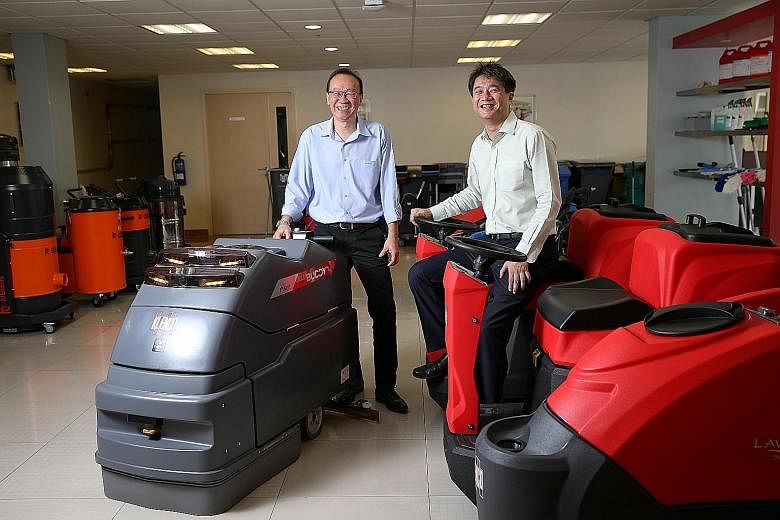Q When was Klenco set up, and what is the company about?
Mr Beh Klenco was set up in Singapore in 1971, and we're celebrating our 45th anniversary this year.
We started off as a distributor of professional and industrial cleaning supplies, mainly smaller products and chemicals.
Over the years, we have expanded to cover a much wider range of cleaning products. These are mostly for cleaning the physical environment, from building interiors to factory yards to roads.
Since 20 years ago, we have also been manufacturing our own cleaning products at our subsidiary in China. It is not a big range, just a handful of products, but it gives us a core equipment product line that we call our own.
Q Tell us more about the cleaning robots Klenco sells.
Mr Tan We sell an autonomous floor scrubber called Muratec Buddy. It can be "trained" by an operator who will map its cleaning route by using it manually for the first time. The machine will "remember" everything and can subsequently run by itself. Mr Beh We started working with our Japanese partners in April last year, who came up with the product and were looking for someone to market it outside of Japan. We've sold some units to Changi Airport, which is widely known as one of the first-movers in adopting automation and technology, and we've also sold some units to hospitals here. Mr Tan Right now, such robotic products are still high in cost, so local SMEs, especially, find it a bit tough to incorporate these machines into their contracts due to the money involved.
We work with the Info-communications Media Development Authority (IMDA) to help our customers get the funding. The IMDA assesses all our products and makes sure they meet the requirements related to productivity and robotics under the iSprint funding programme. At the end of the day, the machine must still be able to do its job - to clean the floor well.
Q How has demand for robotic cleaning products been? And what is the company doing to meet this demand?
Mr Beh Demand has definitely grown. In the last three years, we've seen the market ask for more and more robotic products. This is, to some extent, Government-driven, because the use of such robots can lead to productivity gains and manpower savings.
As we're selling these machines, we're also gathering a lot of feedback and we're going back to our partners to tell them how the product can be improved. We were not involved in the initial development of the product, but right now we're working very closely with them, and some of the modifications or improvements that are being planned came from direct responses we got from our customers and our own experience.
We are also in talks with our partners and exploring what other products we can come up with together. For example, the market has been looking for a robotic dry vacuum or sweeper. There are also a lot of requests for robotic window cleaners, especially for high-rise buildings, for safety reasons.
To develop a robotic product, you need to first have the foundational technology. But our expertise is in the cleaning sector. So rather than trying to do something we have no footing in, it's more realistic to work with a strong partner and offer our vast experience and expertise in cleaning knowledge and application. For example, we can help by selecting and designing the machines.
Q Part of Klenco's business is in servicing the offshore and marine sector. Has the company been affected by the industry's downturn?
Mr Beh Surprisingly, that part of our business has held up pretty well in the last couple of years. Definitely, business sentiment in the sector is not good in Singapore, but where cleaning is concerned, it has been relatively stable. When there is an economic boom, I don't think the cleaning sector follows suit. When the economy goes down, yes, companies do cut down on costs, but for us, it is not as bad, because cleaning is still required. Mr Tan We face ripples but not waves. Mr Beh There will be a slowdown, but there also comes a time where companies cannot not clean. Even if they don't buy a new machine, they will have to extend the operating life of their existing one machine, which means maintenance and repair - so we still get business, although in another way.
Q What are the company's plans for growth?
Mr Beh Robotic cleaners are definitely one key area we see growth in. Right now, it's still a very new market. If we do it right, this will grow to become a major, important part of our business. Geographically, we have mainly been focusing on mass product distribution in the Asean region. The aim, in the next five to 10 years, is for our products to be distributed through our channels on a global scale.


